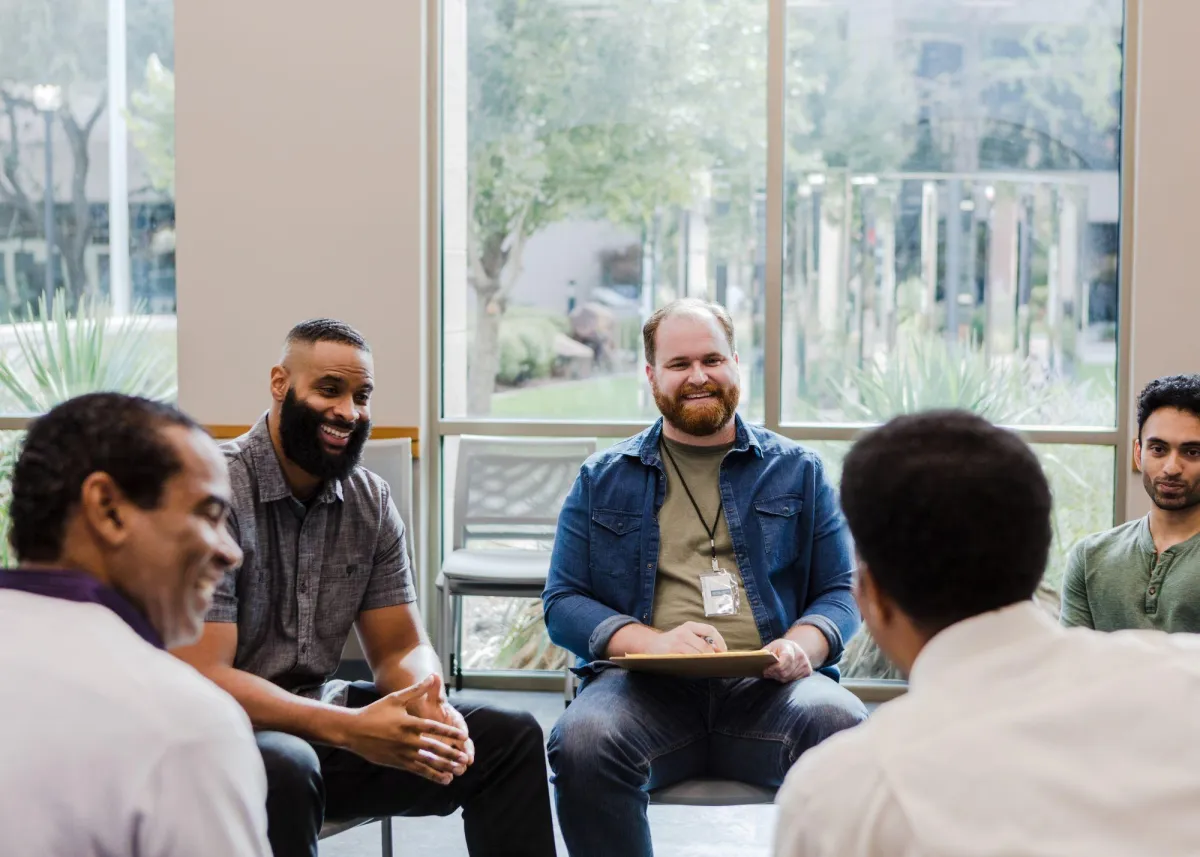Discover Who You Are Meant To Be.
Coaching & Support Groups for Men
We guide men to break free from mediocrity and embrace a life of purpose, strength, and integrity. Our coaching is designed to help you become the leader you’ve always aspired to be—in your relationships, your career, and your life.
If you’re feeling stuck, disconnected, or uncertain about your next step, you’re not alone. We specialize in working with men just like you—men who are ready to reclaim their confidence, unlock their potential, and live with unwavering resolve.
Discover Who You Are Meant To Be.
Coaching & Support Groups for Men
We guide men to break away from a life lacking fulfillment and embrace a life of purpose, strength, and integrity. Our coaching is designed to help you become the leader you’ve always aspired to be—in your relationships, your career, and your life.
If you’re feeling stuck, disconnected, or uncertain about your next step, you’re not alone. We specialize in working with men just like you—men who are ready to reclaim their confidence, unlock their potential, and live with unwavering resolve.
Our ApproAch
Real masculinity isn’t about being the loudest or the toughest.
It’s about knowing when to lead, when to listen, and when to let go.
We guide you in quieting the ego so your spirit can truly expand.
“When I started with Undaunted, I was the golden boy at my company. I had a fat bank account, plenty of responsibilities…and I felt empty. I didn’t know what I wanted to do instead, I just knew that God HAD to have a bigger vision for my life than 40 more years of pushing paper."
- Julian Adorney
You Want To...
Find Your Strength: Through our tailored coaching programs, you’ll learn what it truly means to be a grounded, self-assured man in today’s world.
Lead With Integrity: Leadership isn’t just about what you do—it’s about who you are. We help you develop the discernment and confidence to lead with clarity.
Live Fully and Fearlessly: Life is too short for ‘good enough.’ We empower you to live authentically and boldly—no more playing small or hiding behind your doubts.
If you’re feeling stuck, disconnected, or uncertain about your next step, you’re not alone. We specialize in working with men just like you—men who are ready to reclaim their confidence, unlock their potential, and live with unwavering resolve.
This is the path to becoming the best version of yourself. Are you ready to step up?
Take the first step towards redefining your life and your future.

Become an Undaunted Man
To be undaunted is to hear the voice in the back of your head telling you to give up, that it’s too hard or too scary... AND see that voice for the liar it is.
To face down adversity knowing that the obstacles in your way might be huge…AND also know you have the strength and courage to beat them.
To be undaunted is to live boldly.
To let go of the small man your ego wants you to be... AND step into the powerful man your Spirit knows you are.
Are we striking a chord? Read on.
You’re one of us.
Stop Apologizing for Being a Man.
Start Living with Strength and Integrity.
Solving the Masculine Dilemma—a guide to reclaiming your authentic self, overcoming doubts, and leading with purpose.
Are you tired of feeling like you need to apologize for who you are?
Do you want to break free from self-doubt and live as the confident, capable man you’re meant to be?
Solving the Masculine Dilemma is more than just a guide—
it’s your map to rediscovering your power, clarity, and purpose.
Packed with insights, reflections, and actionable steps
from our expert coaches.
This interactive PDF will help you:
1. Uncover what’s holding you back.
2.Define the man you want to become.
3. Take bold, meaningful steps toward the life you deserve.
In this free guide, you'll get fresh perspectives from both Mark Johnson and Geoff Laughton, our program coaches, on how you can make immediate changes that will have you getting more of what you want out of life.
Download now and start becoming the man who gets what he wants and lives a fulfilling, incredible life.
Group Coaching
This isn’t therapy. It’s not a motivational seminar. It’s a space where men come together, tell the truth, and do the work to become who they’re meant to be.
Group coaching with The Undaunted Man is built around one core idea: you weren’t meant to figure it all out alone.
When you join our group, you step into a circle of men who are just as committed as you are to living with purpose, clarity, and strength.
You’ll be challenged. You’ll be seen. You’ll be held accountable. And you’ll start to change—on the inside first, where it matters most.
If you’ve been trying to white-knuckle your way through it—or numbing out just to get by—it’s time for something different.
You don’t have to do it alone.
You just have to show up.

Relationship Coaching
Is your marriage on the ropes? Do you and your wife barely talk anymore, or are only talking about logistical stuff? Or, maybe you get along well enough, but you feel more like roommates—there’s no spark, and you miss the sexy flirty woman you married (and the flirty sexy man you used to be)?

Business Leader Coaching
Every man should have the opportunity to be a giant in the workplace. To help shape the organization he works for, to transform lives and businesses and leave an impact. Every man should have the opportunity to retire knowing he’s left a real mark on the world. We can help you get there.

Take The Next Step
You don’t have to settle for an ordinary life. Our programs are designed to help you live fully, lead confidently, and create the impact you’ve always dreamed of. Book a free consultation today and find out which program is the right fit for you.

What Our Clients Say...
Brad Revering
Hear Brad share how Mark has helped him both personally and professionally and why he highly recommends working with Undaunted Man.
Jake Mosher
Listen to the impact Undaunted Man has had for Jake- he's been our client since 2018- and has a lot to say about the impact of our mens groups.
Jason Breton
From control freak to being in control- Jason found the Undaunted Man by chance and he's so glad he did.
“My experience with Undaunted was formative in becoming the man I am proud to be today. The feedback and healthy masculine presence provided by both Mark and Geoff…facilitated an accelerated maturing into a wiser husband, skilled father, and solid pillar of my social circle."
Benjamin Hogan
“Mark and Geoff helped me find my passion and build a career out of it. Now I feel lit up every day when I walk into my home office. I can’t wait to start work on Monday morning, and I fall asleep every night satisfied that I’m making a genuine difference.”
Julian Adorney
“By learning to focus on my state of being, and taking action from that place, my life completely transformed. I am currently in a joyful, fulfilled marriage, and an owner of a successful business. The leaders of Undaunted are truly gifted in their work, and are adept at creating a container of growth unlike any I’ve experienced.”
Andrew Kiminski
FAQS
Who is The Undaunted Man coaching for?
The Undaunted Man is designed for men who feel stuck, lost, or unfulfilled. Whether you’re navigating a major life transition, striving to be a better father or partner, or seeking deeper meaning and purpose, our coaching helps you reconnect with your true self and step into your strength with clarity and confidence.
What makes The Undaunted Man different from therapy?
While therapy often focuses on speaking of the past, The Undaunted Man emphasizes personal growth, leadership, and forward momentum. We provide an experience to help you develop the tools, discipline, and mindset needed to live with purpose and integrity.
What can I expect from working with a coach?
You can expect a straightforward, results-oriented process tailored to your needs. Coaching sessions focus on uncovering your internal blocks, setting clear goals, and taking actionable steps toward becoming the man you aspire to be—disciplined, fulfilled, and confident.
How do I get started?
It starts with a conversation. Schedule a free call, with either Mark or Geoff, to explore your goals and challenges. Together, we’ll determine if The Undaunted Man coaching is the right fit for you.
MEET OUR TEAM

Mark Johnson
Mark is a men’s coach, business and relationship coach, facilitator, and wilderness guide with more than 20 years of experience helping people and companies grow. He has been part of The Undaunted Man since 2014, and its CFO since 2016.

Geoff Laughton

